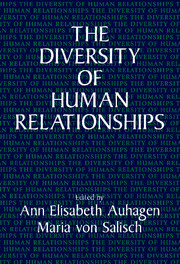Book contents
- Frontmatter
- Contents
- List of contributors
- Acknowledgments
- Introduction
- I Foundations
- II Relationships within the family
- III Partnerships
- IV Private nonkin relationships
- V Relationships at work
- 12 Relationships between colleagues
- 13 Occupation-determined role relationships
- Epilogue
- Author index
- Subject index
13 - Occupation-determined role relationships
Published online by Cambridge University Press: 20 May 2010
- Frontmatter
- Contents
- List of contributors
- Acknowledgments
- Introduction
- I Foundations
- II Relationships within the family
- III Partnerships
- IV Private nonkin relationships
- V Relationships at work
- 12 Relationships between colleagues
- 13 Occupation-determined role relationships
- Epilogue
- Author index
- Subject index
Summary
Introduction
Interpersonal relationships can develop in different ways. There are relationships within families and with relatives, those centered on leisure and sport activities, contacts that come about by chance and those that develop at work or through the occupation, that is, work-determined relationships. By this we mean interactions between colleagues in an organization or institution, interactions between business partners, and interactions that are work-determined in only a “unilateral” way (such as salesperson–customer or doctor–patient). This chapter focuses on work-determined role relationships. After a discussion of the role concept and levels of formality or informality in a relationship, the following aspects will be addressed: what significance does the occupational role have in society, for the concept of self, for personal experience, and for the social interactions of a person? What conflicts develop when particular work roles are taken on? Are roles and role relationships inflexible? Do they restrict our interactions? Is there also evidence of attitude and value change in role relationships? Finally, we illustrate the theoretical aspects by considering the doctor–patient relationship.
Concept definitions
The role concept
Sociological role definitions emphasize the aspect of expectations that are associated with a social position; the person occupying the position is acting a role. A role is defined as the sum of normative expectations that other people have of someone occupying a position (compare Joas, 1980; Wiswede, 1977). Increased precision and unambiguity of such behavioral rules and expectations make it more difficult for the role bearer to exercise the role in keeping with his or her own personality and individuality.
- Type
- Chapter
- Information
- The Diversity of Human Relationships , pp. 289 - 314Publisher: Cambridge University PressPrint publication year: 1996
- 1
- Cited by



